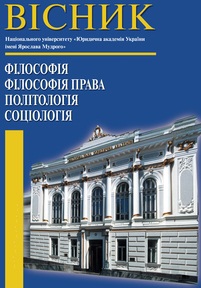ПРАВОВЕ ЖИТТЯ ЯК ФЕНОМЕНОЛОГІЧНА МОДЕЛЬ: ПОНЯТТЯ ТА СТРУКТУРА
LEGAL LIFE AS A PHENOMENOLOGICAL MODEL: CONCEPT AND STRUCTURE
Author(s): Inna Igorivna Kovalenko, Eduard Anatoliyovych KalnytskyiSubject(s): Epistemology, Ethics / Practical Philosophy, Social Philosophy, Philosophy of Law
Published by: Національний юридичний університет імені Ярослава Мудрого
Keywords: social epistemology; non-classical understanding of law; legal values;
Summary/Abstract: Problem setting. The contemporary understanding of law implies addressing theoretical opportunities of phenomenology and, in particular, allows finding and describing structural elements of the phenomenological law model.Recent research and publications analysis. The method of modelling is widely used in modern social epistemology. Being influenced by post-empirism new approaches emerged in social epistemology. The leading role in them is given not to empirical evidence and logical-deductive procedures, but to the models of theoretical explanations, which are used by this or that research strategy.Paper objective is to single out and describe the elements of the phenomenological law model from the viewpoint of its structure, formed by social experience and legal values.Paper main body. The article discusses the structural elements of the phenomenological model, its methodological significance was shown ass the focus of the legal life description, specifying the content of meaningful dimensions and dimensions-phenomena.The essence of the modelling procedure was identified, its connection with other phenomenological procedures was confirmed. Suggested phenomenological model measurements include: social experience, giving the context for implementing all other elements of the legal structure; legal values, determining the aim and the content of legal practices; legal entities, characterized by their abilities to act and be recognized in the legal domain; legal entity reasons, actualizing their abilities and bringing meaning to legal facts.Social experience and legal values were studied as measurements-phenomena (or the given legal life) and as structural elements of the phenomenological model. The basic structural element and the overall meaningful framework of the phenomenological model determine social experience. The content-genetic unity of the social experience with the concepts of experience, life world and activity was analyzed. It was confirmed that the social experience is always the experience of activity, taken from the entity expression. The social experience in the legal context appears as the total of collective actions to recognize legal values, expressed in the social facts and activity schemes. Therefore, legal values were determined as essential meaningful grounds and principles of law, determining the practical value of the claims of the legal entity and ensuring its involvement in the social – cultural, processes of the specific society.The content-genetic connection between the legal values and legal regulations was specified, whereas the difference between them was also shown. Conclusions of the research. The phenomenological model is designed to assist the integrity of law from inside and strengthen the effect of the description and interpretation of legal life specific manifestations. The consequence of the relative analysis of legal values and regulations was the development of the mechanism of their connection with the social experience and general human values.
Journal: Вісник НЮУ імені Ярослава Мудрого. Серія: Філософія, філософія права, політологія, соціологія
- Issue Year: 40/2019
- Issue No: 1
- Page Range: 50-73
- Page Count: 24
- Language: Ukrainian

